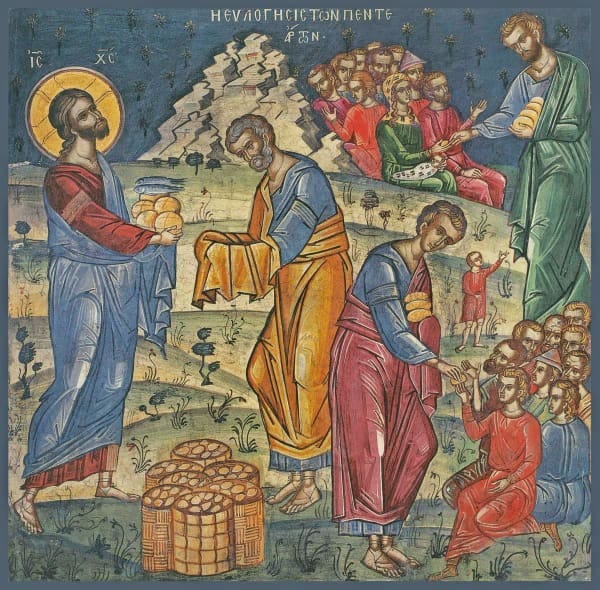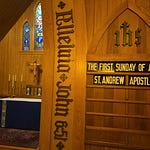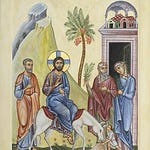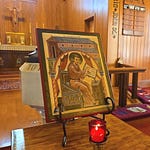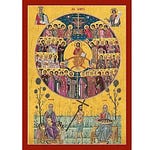In the Rector forum sessions this Lent, we have been reflecting on the beginning verses of the Gospel according to St John. These comprise what is called John’s Prologue, the first eighteen verses. Within John’s Prologue, which is something of a summary of his Gospel account from beginning to end, there comes verse 14: “And the Word became flesh, and dwelt among us.” It is commonly thought that this verse refers to Our Lord’s Nativity, the taking of human flesh from His mother, Blessed Mary, and dwelling among us, which is taken to His coming to human life.
Yet this interpretation runs aground upon reflecting that four verses earlier in verse 10, we hear “He was in the world, and though the world was made through him, the world did not recognize him.” Christ is already in the world. And then verse 11 “He came to that which was his own, but his own did not receive him.” He was in the world and walking around, coming to His people who did not receive Him. And even before that, the Evangelist describes Saint John the Baptist in his adult maturity, verses 6-8: “There was a man sent from God whose name was John. He came as a witness to testify concerning that light, so that through him all might believe. He himself was not the light; he came only as a witness to the light.”
So given all these verses, the famous verse 14 would not logically be about Our Lord’s Nativity, at all (John simply presumes it in his account, not describing it). But then, what is verse 14 about? “And the Word became flesh, and dwelt among us.” This is a fitting Sunday to reflect on this, both because of our Collect, which speaks of Jesus Christ coming down from heaven to be the true bread, and because of the teaching about “gift” which we hear today from Saint Paul.
Saint Pauls tells us today we have been saved by grace through faith, and that this faith is a gift from God. God has given us faith. This is His gift to us who are His people. The gift of God for the people of God. Paul says that out of God’s great love with which He loves us, He has made us alive with Christ. God has raised us up with Christ, and even made us sit with Christ in the heavenly places in Christ. This is all the gift of God: the gift of Faith, given by God.
Paul reminds us that God’s gift raises us up with Christ. Because the gift of faith is the gift of Christ. God’s gift of His Son saves us. God’s gift of His Son gives us life. This reminder we need to hear, given that we have been reflecting on our concupiscence. We see our concupiscence, our wretchedness, our inclination to sin, but holding ourselves up to Christ, Who is like us in all ways, except for sin. God indeed does want us to hold our life up to the Light of Light Who is Jesus, He whose nature is uncreated Light that is brighter than any light visible. He wants us to hold ourselves up to Him, that the shadows of our inclination to sin become evident to us that we may truly acknowledge our wretchedness before God.
This acknowledgement of our wretchedness, the acknowledgement of our concupiscence, the acknowledgement (in another image from Paul) of the darkness of the old man still present with us which is our fleshly desire – acknowledging this along with lamenting our sins has a very clear purpose according to our Prayer Book liturgy: that we may obtain of the God of all mercy, perfect remission and forgiveness. All God wants is a human heart that understands itself in honesty and sobriety, and through the lamenting of sin and acknowledgement of concupiscence by which the sober truth about us is uncovered, therefore is a heart that understands itself as always in need of the gift God in His love has given us: a heart that knows it is always in need of a Savior is a heart in which the immeasurable riches of the grace of our Lord Jesus Christ are known, and thus truly received. Because Christ is the gift that gives us Faith.
In the beautiful liturgy our parish uses for Stations of the Cross, at the first Station, when we reflect on Jesus condemned to die, we ask our Lord Jesus to grant us true repentance – that is, a true turning of our mind to God, a true opening of our heart to God – that, being washed in that stream which flows from Calvary through the Sacraments of Thy Holy Church to the end of time, we may evermore serve Him with pure hearts and minds. All this is part of the gift of Faith given by God. The gift of Faith is the gift of Christ. And the gift of Christ is the gift of His sacrifice for us and for our salvation. And the gift of His sacrifice is what He chose to do for us: that for us and for our salvation, He was born of Blessed Mary, taking her human flesh and ours upon Him; that He lived a human life that heals, teaches, guides, strengthens, chastens, and loves; that He willingly entered into His Passion, Death, Resurrection, and Ascension, all that the Holy Ghost Who proceeds from the Father could be sent by Christ, through Him upon His apostles and through them upon all people; and that we would be daily washed in that stream which flows from Calvary through the Sacraments of Thy Holy Church; specifically the Sacraments of Baptism and Eucharist. Baptism incorporates us into His Body, and Eucharist is the way Christ feeds His Body. He is the Bread of life. Saint John tells us our Lord said these words: “I am the living bread which came down from heaven; if any one eats of this bread, he will live for ever; and the bread which I shall give for the life of the world is my flesh.”
And here is revealed the true meaning of John 1.14: And the Word became flesh, and dwelt among us. Christ who is the Eternal Word of the Father, His Only-begotten Son, begotten of His Father before all worlds: Christ through His incarnation which first began when He said “Let there be light” and continued as He made Himself evident to the patriarchs and prophets of old; an Incarnation which continued through His nativity, and then through His death, resurrection, and ascension: this Incarnation of Christ, always happening through all of chronological time, reached its climax as Christ truly became flesh – that is, in His own words, truly became the living Bread which came down from heaven, the Bread which He gives for the life of the world: the Bread which is His flesh. Christ became flesh and dwelt among us; Christ became Bread and dwelt among us; Christ became Eucharist that He can dwelt among us, as we receive Him Who is our food, the spiritual medicine of love for our soul, that through Him as Eucharist we might be raised up with Him to sit in the heavenly places, through Him Who is the Bread of Life, given as a gift to those lamenting their sins and acknowledging their wretchedness; and Who lives and reigns with the Father in the unity of the Holy Ghost, ever one God, unto the ages of ages. Amen.


